On my first full day in Pokhara, Nepal, a petite woman strolled down the sidewalk and stopped in front of my table at the open-air restaurant where I was enjoying lunch. Her muted, horizontal striped apron was cinched around an ankle-length gray dress and long, glistening black braids wound around her head. A wide smile split her ruddy cheeks as she greeted me in Nepali fashion.
“Namaste. How are you?” My polite reply was enough encouragement; she sat down at my table.
“I am Tibetan,” she announced as she pulled pouches and bags out of her backpack. Soon, every spare inch of tabletop was covered with handmade earrings, necklaces, rings, and bracelets. She was the first Tibetan person I had ever met, but she would not be the last.
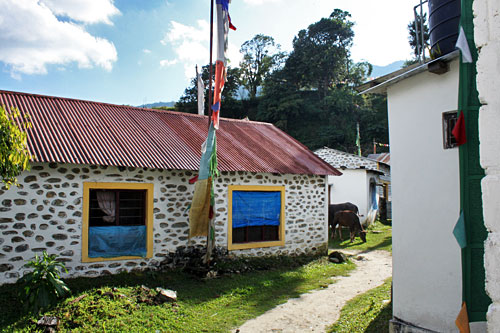
In 1959, thousands of Tibetans crossed the rugged Himalayas on foot, fleeing a brutal occupying Chinese army that destroyed monasteries and massacred thousands of monks as they advanced. Those who made it to Nepal were granted refugee status and allowed to settle on land donated by the Nepali government. Although many Tibetans have since emigrated to other countries, about 20,000 still reside in these original refugee camps, many of which are located in and around Pokhara.
Eventually, realizing I wasn’t interested in buying anything, my new Tibetan acquaintance stuffed the jewelry back in her bag but made no move to get up. Instead, she pulled off her thick black shoes and began rubbing her swollen feet. “All day walk, up and down, but no customers. Business very, very bad,” she sighed.
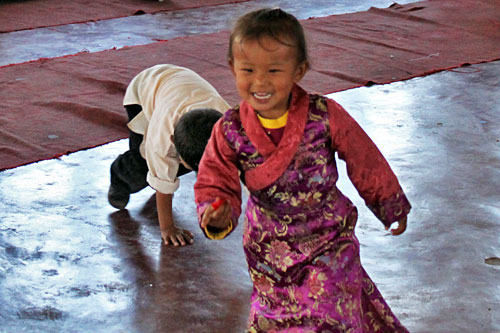
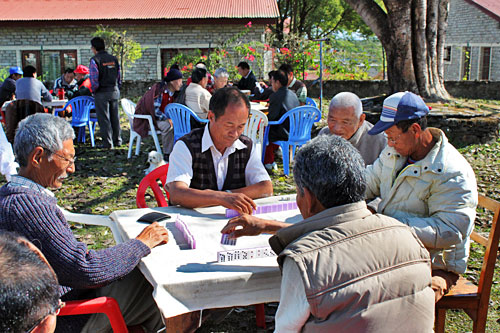
Shoving my plate into the center of the table, I encouraged her to share my lunch as she told me about her life. The jewelry she sells is handcrafted by her disabled husband in their home in the Tarshi Palkhiel Tibetan refugee settlement, located on the outskirts of Pokhara. Each day, though her doctor has advised her not to carry heavy weights, she slings the overloaded pack on her back, takes the bus to town and peddles her wares to tourists, hoping to earn enough money for daily living expenses and save a bit for her children’s college education. Too soon, she pushed back her chair, flashed me a beaming smile, and was on her way, leaving me to ponder how someone who lived with such hardship could seem so content and joyful.
In the weeks that followed this initial encounter I befriended many more Tibetan refugees in Pokhara, who eagerly shared their stories with me. Those who arrived in Nepal prior to 1990 are recognized as refugees and have legal residence and religious freedom, however, their civil, political and economic rights are limited and many have no identity documents. Even Tibetans who have been born and raised in Nepal are denied citizenship due to political pressure from China, which insists that all Tibetans should be arrested, charged as criminals and repatriated to Tibet. Sandwiched between two superpowers – China and India – tiny little Nepal bows to pressure from both the north and south.
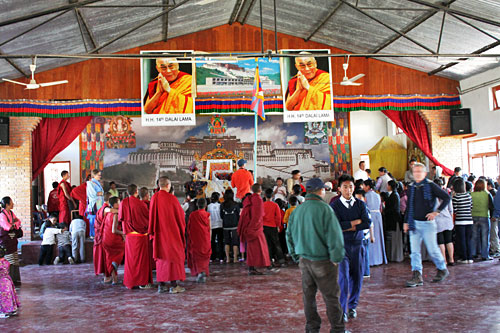
The approximately 1,000 new Tibetan refugees who arrive each year are not allowed to stay permanently in Nepal but they are officially allowed to transit Nepal on their way to India, although a recent wikileaks document revealed that China has been paying Nepali police officers to capture and return Tibetans who attempt to cross the border. For the 20,000 refugees who legally reside in settlement camps around the country, life is somewhat of a dichotomy. Supported by subsidies from Dharamsala, India, the seat of the Tibetan government in exile, they live in homes that are comfortable and relatively modern, by Nepali standards, and the cost of each child’s education is largely subsidized. But the attention being paid to Tibetans in Nepal by the Chinese government is causing a new level of discomfort for the refugee community.
Last year, as Tibetans in Kathmandu celebrated the 51st anniversary of their failed struggle for independence from China, police rounded up and jailed dozens of undocumented Tibetans. Scores of videos showing police brutality toward Tibetan who participate in Free Tibet protests have been uploaded to the Internet. Yet in many cases jailed Tibetans are quickly released, indicating that Nepal may be taking halfhearted measures designed to appease a Chinese government that provides an ever increasing amount of foreign aid to Nepal.
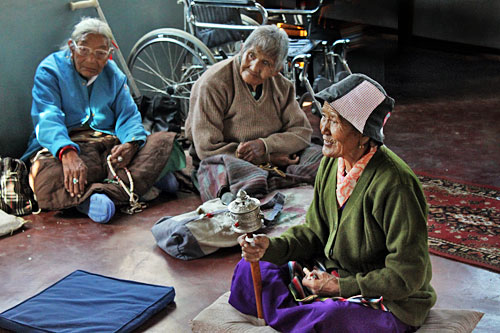
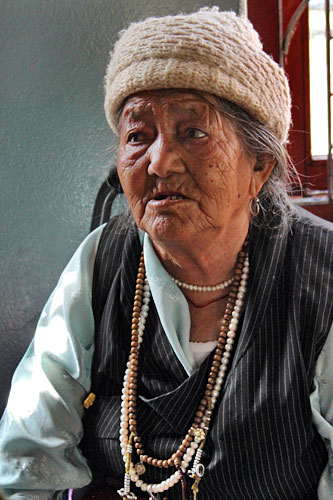
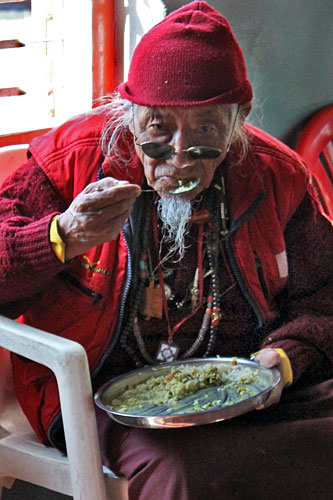
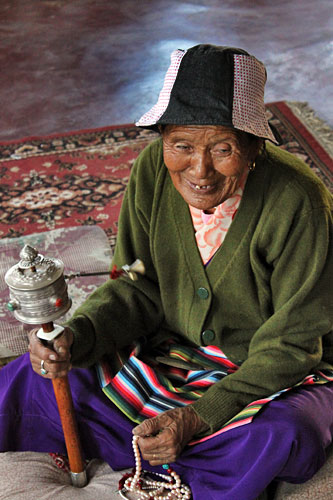
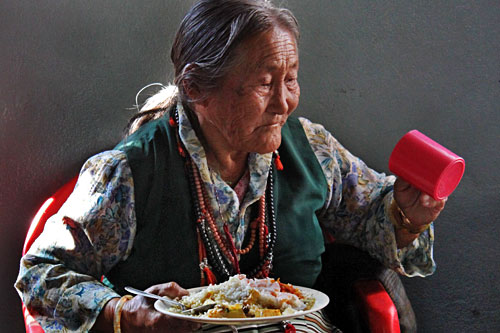
Fortunately, most, if not all, of the protests against the Chinese government occur in Kathmandu, thus this type of violence is rarely seen in idyllic Pokhara. Tibetans come and go without harassment, sell their wares on the sidewalks, and even own businesses. As a regular visitor to Tashiling, I was welcomed into the refugee community. Monks at the monastery automatically unlocked the door when I arrived to meditate; my friend Sinon, who runs the book and gift stores at the monastery fed me more than one meal in her home; and one of the village elders invited me to stay in the community guest quarters. On December 10th, International Human Rights Day, my Tibetan friends insisted I join them for an annual celebration that marks the anniversary of the Dalai Lama being awarded the Nobel Peace Prize in 1989.
When the games were over and the last morsel of food had been devoured, I sat in the shade beneath a giant tree in front of the community center, watching energetic children play tag and men with crafty grins slap dominoes on plastic patio tables. Gazing out at a sea of smiling faces, I was suddenly in awe of these inspiring people, who have endured almost insurmountable difficulties without becoming bitter. Without exception, every Tibetan I interviewed expressed gratitude to Nepal for allowing them to stay in the country and for donating land on which they settled. And I realized that this is their greatest strength. The Sleeping Dragon – China – may be stoking its furnace, but it is no match for the resilience of Tibetans. Despite everything, they endure.

Thank you for sharing with us, I think this website truly stands out
I just stumbled across your blog looking for jewelry made by Tibetan refugees for gift this holiday season – it is also my DREAM to travel to Nepal, Tibet, Bhutan….oh – all of southeast Asia..If you have any recommendations for a good/legit on-line store that would support refugees – please contact me…thank you!
Hi Sue: So sorry but I know of no such store.
I think when we have certain countries we love to visit and feel an affinity for, we can’t help but write and post frequently about them, since it’s our passion. That to me is what sets a blog like yours apart from the run of the mill “If it’s Sunday, this must be Paris” type travel blog that just details the attractions and places to eat and stay in numerous ever-changing locations. Keep it up!
Hi Melanie! I prefer to immerse in the places I visit, so I stay longer, and
I often worry that visitors to my blog will get tired of reading about one
place. Thanks for telling me you don’t!
It’s fascinating to read your blog and your photographs are an incredible addition. Thanks for sharing your moments.
Nepal is definitely on my list of places to visit. There is something that draws me there. I feel so helpless when I hear stories like this. It speaks volumes that these people are still persevering and still living a peaceful and happy life.
This may not be too popular, BUT—if you have the money to travel, and backpack all over the world — then you certainly have enough money to buy one piece of jewelry from this woman !! Since you don’t ‘want any more stuff’–give it to your hotel maid or your waitress. I mean – GEESSHH …
These people you ‘talk’ to need the money you have more than you do to NOT have any STUFF.
Plus, just going and writing about it changes NOTHING.
Volunteer there; donate money for a school; teach there; help them out.
Writing on here only reaches about 10 people in the West.
All these blogs do is show how many “Ugly Americans’ there really are.
I’m an American-Canadian and when I travel – I always buy something, and then give it away to someone else.
I also volunteer here in my community in Canada, I donate money to overseas’ causes that DO something.
I also send packages to overseas communities.
I am certainly NOT perfect, but I know that I don’t just write about it.
Dear Cyn:
Thank you for visiting my blog, reading my article and taking the time to
comment. I appreciate it. However, I feel compelled to relply briefly to
some of your accusations. First, it sounds like you think I am rich.I am
not. I left a job I hated that had made me so sick I was bedridden and
slapped a backpack on to do the only thing I ever wanted to do – be a travel
writer. In the process, I had to give up my home and lost a second piece of
property, which the bank sued me over when I could no longer make the
payments. I used the little money that remained in my savings to build and
promote this blog and fund my travels for the last four years, hoping to
make the blog a success. Thankfully, it has just begun to break even this
year, so it is now paying for my travel, although I still have to stay in
extremely busget accommodations – my limit is $15 per night and I try for
$8-10; I eat only one meal per day unless I’m at a hostel that provides
breakfast, etc.
Second, I’m proud of you for the good work you do. If everyone would follow
suit, it would be a much better world. Every one of us is capable of helping
another human being, even if it is to offer a kind word. However, you are
quite wrong to assume I do not do the same kinds of things. It would have
been nice if you asked before you accused.
Finally, in third world countries, I am constantly surrounded by vendors
trying to hawk their wares. This Tibetan woman was one of at least 20 who
tried to sell me something – every day. Do you suggest I buy something from
each one In every place I visit? Has it occurred to you that by feeding her
and talking to her like a human being, rather than ignoring her as a
faceless, useless trinket seller, as most people do all day long, I was
indeed helping her in some small way. Sometimes, the small gestures are just
as important.
This non-ugly American (with Canadian roots – my mother was born there and
half my family is there) is wishing you a lovely day and safe travels.
Well– you are so right to say I should have asked you first. I admit that I was wrong on that one, for sure.
No one is perfect, and I am CERTAINLY not perfect – not at all. I just don’t get the whole thing about ‘cultural travel’ and that just writing about it makes a change. I just don’t see it. Talking to people is fine and all, but how does that really help her?
I do remember, however ghastly it was – to have beggars constantly trying to sell us flowers in Spain at our restaurant tables. I do understand NOT wanting to buy something from every single vendor – I do !!!
I also SO understand about working a job you hate. I did that too. And, believe you me – I do understand about losing part of your life. But, that is not what this is about.
This is about Western travellers gawking at the citizens of the countries they are visiting, and thinking that we make a change by ‘being nice to them and talking with them’. I don’t speak Nepalese, Tibetan, Spanish, or any really exotic language. I just ‘get by’ with my travel dictionaries, charades, hand gestures, etc.
SO – without aggravating you any further – I’ll just be quiet now. I am really not trying to hurt your gestures in your travels at all. I really don’t understand how We Westerners think we are helping the ones we are gawking at by chatting. It just doesn’t do anything for them.
And, my paltry and teensy contributions that I make in my small community here – are just that – paltry and tiny by others’ larger time with the less fortunate here. Whether I’m talking about Canada – my adopted country, or my birth country.
It’s all about perspective – and mine – may be totally skewed. I admit that. Perhaps I am just WRONG.
Sorry to have bothered you or upset you – I really did not mean to do that at all. Sadly for me, my mouth gets away from my brain sometimes. Do enjoy your travels – it’s better than sitting around feeling sorry for yourself- which I did in my past. Cynthia
Cynthia, thanks for not being what I thought you were, and actually being open-minded and kind. Barbara is the real deal, completely respected and admired by me and many others in the travel writing community (yes, there is one). After reading your initial comment I was all geared up to defend Barbara, who I count as a friend — but she needs no defending.
As an aside, and to Barbara: I don’t think I can recall your writing ever being as…happy, I guess, as it’s been since you’ve reached Nepal. It’s great to see, and keeps me coming back.
Thank you so much Jen! Interesting that you used the word kind, because
that’s one of my goals in life, to be as kind as I can to everyone. I don’t
always succeed because, as Cynthia said, none of us is perfect. But it
really makes me feel good when people say such nice things about me. And you
are so right about me being happy. I’ve never in my life been as contented
and happy as I am right now, despite not even having a permanent home.
Strange, all the things I thought I’d need as I approached retirement age
now seem so unnecessary. I just had to go after my dreams and keep the
faith. But I never could have done it without the help of all my friends in
the travel blogging community. I’m really blessed.
Barbara,
I think the conversation between you and Cynreynolds is thought-provoking and worthy of more discussion. Although the tone of her challenging email may be unwarranted in your situation, it is not so in other travelers.
We have all been confronted by those trying to eek out a living in third world countries. Many of us make assumptions about these people similar to the thoughts we have of those who stand next to the exit ramps and street corners here in the US. They make us uncomfortable. We feel shamed for what we have. We may even blame them for their own situation (laziness).
I was inspired by how you handled this woman. Sitting down and talking with her honored her a fellow human being. More than money, you gave her your “present moment.”
Thanks!
Thank you Darrin. I was actually very impressed by Cynthia and her
willingness to discuss this subject openly and without becoming defensive. I
didn’t want to negate her feelings on the subject – we all have a right to
our opinions, and on one needs to be right or wrong – but I felt compelled
to present my thoughts on the subject.
She may have a point in regard to writing about these interactions. I often
ask myself if what I do is helping in any way. I write about other cultures
not only because it fascinates me, but also because people, especially in
the U.S., seem so fearful about overseas travel. The question I am most
often asked is, “Aren’t you afraid?” And I always tell people, “There is
nothing to fear.”
Fear is a product of the unknown. We think people are “different” from us.
We think all foreigners hate Americans. This is just not so. I have found
that people all over the world are more alike than we are different. We all
share the same hopes and fears. We all want the same things. The woman who
was selling the jewelry worked hard to provide for her family, hoped to send
her children to college so they would have a better future, was dealing with
health issues, etc. All universal issues.
As they say on bumper stickers, we are “one human family.” And that is the
idea I hope to get across by writing about other cultures. My belief is that
the better we know one another, the less likely we will want to kill one
another. I may be only one small voice for world peace, but ever little bit
helps. Thank you so much for taking the time to read and comment on this
article. Very much appreciated.
You know what I like about this? The moment where you shift the jewelry lady from pitching you as a tourist to a real human with real stories by sharing your lunch with her. I’m totally taking that tiny act to heart and seeing if I can remember to do that when I again find myself in the same place. In that simple action, you are both giving her something and breaking the wall. The presence to remember to that … well, that’s so admirable.
Pam: The mere fact that you READ my writing has always astonished me, as I
am in AWE of you, but for you to write something so sincerely nice about
what I did and said, well, you’ve made my day…no, my week. Maybe my month.
😉
It’s incredible that Nepal (still) doesn’t issue citizenship or even residency for people who’ve been there so long. I can imagine just that restraint makes it very, very difficult for people to make better lives for themselves.
Hi Anil:
I was also quite shocked when I learned this. I wasn’t so surprised that the
refugees who originally arrived had not been granted citizenship, but the
idea that those who had been born in Nepal could not be citizens was quite
mystifying to me, most likely because anyone born in the U.S. is
automatically granted citizenship. Over time, I learned that in addition to
the pressure from China, there is another dynamic at work in Nepal. Parts of
the southern border are in dispute with India and since Nepal does not have
a large enough military to patrol the entire border, Indians encroach on
their land a little more each year. The fear is that if anyone born in Nepal
can become a citizen, more and more Indians and Pakistanis will arrive,
settle, and have babies. Being such a tiny country with an a small
population base, in one or two generations at most, the Indian and Pakistani
population could outnumber the Nepalis and control the popular vote. As I’m
discovering through slower, long-term travel, there’s always more to the
story.
I am intrigued and repelled by the Chinese philosophy in Tibet. Their philosophy of “it will be better for them if we take over” and their tactic of populating Tibet with Chinese people to outnumber them sounds eerily like the Europeans coming to America in the 17th and 18th centuries.
We met another woman in Pokhara with the same story. It is a very sad situation to be stuck without a country and a means to work. I have sympathy for the women that have to sell jewellery on the street. They always have a story and deeper meaning as to why they are doing what they do.
Hi DavenDeb: I know, it is so hard to tell them I cannot buy – I’m just not
interested in having more “stuff” in my life. But at least I can help by
writing about it and letting others know the situation.
I’m always impressed by people who triumph in the face of such severe adversity. How wonderful that you got to talk to so many of the local people. Such a great experience. Loved this post!
A lovely story – and educational one too! My father and I stopped at one of the camps outside of Marpha. I wish I could have spent more time there – but we only had an afternoon. The relationships you’ve made are admirable – and your photos of the refugees are amazing!
I’ve always wondered how Nepal handles being ‘in the middle’…a place I wouldn’t want to be!
Such an interesting post! I met some wonderful Tibetans when I was in Lhasa. Their spirits just shined!
I’m not sure if this is a post I missed before or a new one, but it is impressive. I knew most of the details you outline, but your pictures really bring to life the images already in my head. They are wonderful, fitting tribute, as you say to these incredible people.
Hi Islandmomma: Thanks, as always for reading and sharing your thoughts.
Interestingly, I had three almost immediate unsubscriptions to my email
notices of new posts when this article was published. Makes me wonder if
people are getting tired of reading about Nepal or don’t want to read about
the political situation, which is so inextricably woven into the fabric of
life in Nepal. Or maybe it’s just a coincidence. Over the past few days I’ve
also gained a dozen subscribers, But no worries to you all, I will soon be
moving on to other areas of SE Asia!
Who knows?! No worries. I could read about Nepal forever, largely thanks to your blog, and you are always true to yourself, which is the important thing.
Thank you for such a great article. I would like to request you to help me by providing some specific details of individuals. I am a writer based in Kathmandu writing a novel about refugee issue in Nepal. However, I don’t seem to be able to make a pan insightful research. I admit it is my naiveness. But culd you please write to me how they are culturally adapting in nepal. Thanks.
Hi Sandesh: I’m afraid that would be improper for me to do, as I would be giving you only my opinion. If you are doing research, you need to record the details directly from the source, not from a second-hand person. I suggest you hire a Tibetan translator and visit the refugee camps personally. The Tibetan community is very welcoming and you won’t have any trouble finding people who will be willing to speak to you.